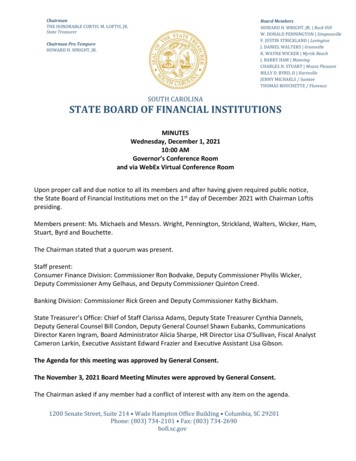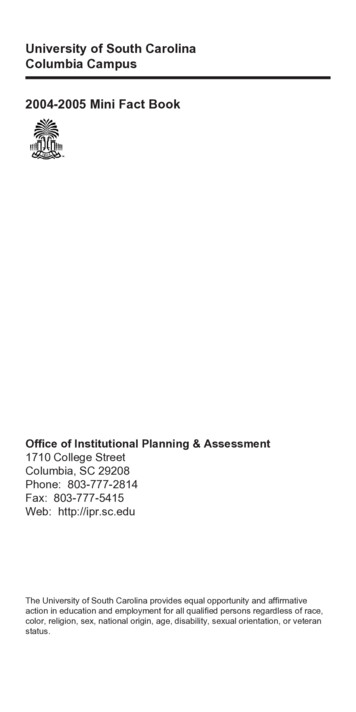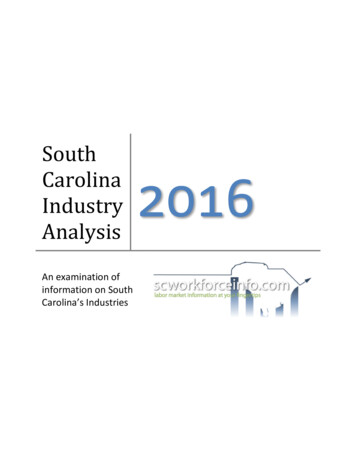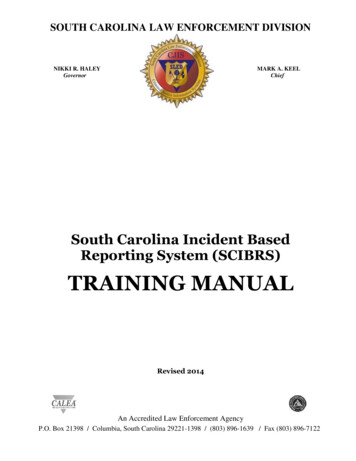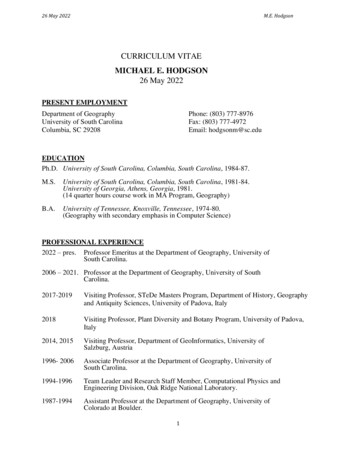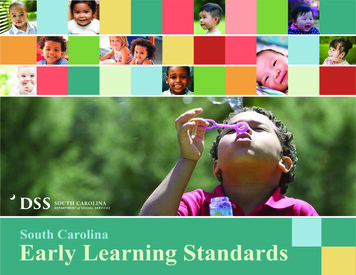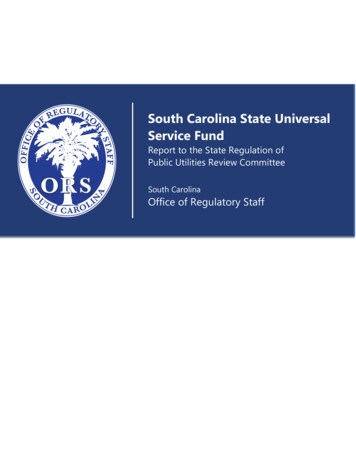
Transcription
South Carolina State UniversalService FundReport to the State Regulation ofPublic Utilities Review CommitteeSouth CarolinaOffice of Regulatory Staff
Contact:Clayton Vaughncvaughn@ors.sc.govThis document is available upon request by contactingthe South Carolina Office of Regulatory StaffORS thanks Interserra for providing Telecommunications Regulatory Fees & AssessmentUniversal Service FundsThe South Carolina State Universal Service FundReport to the State Regulation of Public Utilities Review CommitteeSouth CarolinaOffice of Regulatory StaffMay 25, 2022
Table of ContentsAcronyms3Executive Summary4Applicable Laws and Guidelines4The South Carolina Universal Service Fund6Disbursements from the SCUSF9Scope of ORS Analysis10ORS Review of SCUSF10Recommendations13Conclusion14Appendix A15
Acronyms Used in this ReportAct 181 – State Telecom Equity in Funding ActCOLR – Carrier of Last ResortDOR – South Carolina Department of RevenueFCC-Federal Communications CommissionLEC – Local Exchange CarrierORS – the South Carolina Office of Regulatory StaffPSC – Public Service Commission of South Carolina or the CommissionPURC – State Regulation of Public Utilities Review CommitteeSCTC – South Carolina Telephone CoalitionSCUSF– South Carolina Universal Service FundVoIP – Voice Over Internet Protocol3
Executive SummaryS.C. Code Ann. § 58-9-280 (E)(11)(b) requires the Office of Regulatory Staff (ORS) toprovide a report to the State Regulation of Public Utilities Review Committee (PURC)every four years as to the status of the South Carolina Universal Service Fund (SCUSF),provide recommendations, and provide such other information as the PURC deemsappropriate.The ORS examined information provided by telecommunications companies thatparticipate in the SCUSF to analyze and review each company’s use of the funds. Thisreport provides insight on the current state of the SCUSF, the ORS administration ofthe fund, disbursement to the telecommunications companies, responses from thetelecommunications companies to ORS questions, and the ORS analysis andrecommendation. To conduct the ORS examination, the agency sent each Carrier ofLast Resort (COLR) an information request to aid in determining how each companyused capital expenditures to enhance and improve South Carolinatelecommunications networks. Based on a review of documents and responsesprovided by the companies, the ORS determined the telecommunications companiesused SCUSF funds as intended.The ORS makes the following recommendations:1. An analysis of all revenues and expenses for each COLR should be conductedto determine a) whether the current funding level of the SCUSF is sufficientand b) whether distribution levels to COLRs are appropriate.2. The PSC should have the authority to suspend or reduce the level of SCUSFsupport if a COLR fails to meet its obligations to provide basic voicecommunication services, including 911 service.Applicable Laws and GuidelinesUnder federal law, universal service is the principle that all Americans should haveaccess to communications services. Eligible telecommunications carriers, asdesignated under section 214(e), shall be eligible to receive federal universal servicesupport to provide these services. As described below by the Universal ServiceAdministrative Company on its website:4
Universal service is based on the principle that all Americans shouldhave access to a baseline level of telecommunications service andfurther the public interest of keeping all Americans connected. Thisprinciple is the cornerstone of the Communications Act of 1934, whichestablished universal service in legislation and also created the FCC.Since that time, universal service policies have helped make telephoneservice widely available throughout the U.S., even in rural areas. 1Today, federal universal service not only supports voice services but also supportsbroadband services.Under state law, a COLR is defined as a facility-based local exchange carrier, asdetermined by the Public Service Commission of South Carolina (PSC or theCommission). Consistent with the federal Telecommunications Act of 1996, a COLRhas the obligation to provide basic local exchange telephone service, upon reasonablerequest, to all residential and single-line business customers within a defined serviceor geographic area. A COLR may meet its obligation by using any available technologyof equal or greater service quality than is required by applicable Commissionregulations as of the effective date of this item including, but not limited to, theprovision of a broadband connection that allows the customer to access basic voicegrade local service from the COLR or other available voice provider of the customer'schoice. Notwithstanding any other provision of law, and regardless of the technologyused, the basic voice grade local service provided to meet this obligation is subject tothe PSC’s jurisdiction with respect to service quality and rates and is entitled to SCUSFsupport as set forth in Section 58-9-280 (E) (4) and is capped, except for the costs ofthe Lifeline program and the cost of administration of the program.South Carolina law requires periodic status reports on the SCUSF to be submitted tothe PURC. This report is submitted pursuant to S.C. Code Ann. § 58-9-280 (E)(11)(b)which provides as follows:” .[t]o create an environment that ensures financial stability necessary to encouragelong-term investment by carriers of last resort while providing for appropriateoversight:(a) within two years after the effective date of this subitem, the Office ofRegulatory Staff shall provide a report to the Public Utilities Review Committee (PURC)as to the State Universal Service Fund, the need for funding, and the appropriate levelof distributions; and(b) every four years thereafter, the Office of Regulatory Staff shall provide areport to PURC as to the status of the State Universal Service Fund, ce/5
recommendations, and provide such other information as the PURC deemsappropriate.The initial report included significant historical and operational information and wassubmitted on May 25, 0report.pdfThis second report addresses the status of the SCUSF and provides recommendations.The South Carolina Universal Service FundIn 1996, the South Carolina General Assembly directed the PSC pursuant to 1996 S.C.Acts 354 (Act 354) to establish an SCUSF for distribution to COLRs in S.C. Code Ann. §58-9-280(E).year 2022.2The table below shows a summary of the SCUSF expenditures for fundState USF Expenditures SummaryFund Year - 2022Expense CategoryUSF SupportLifeline SupportORS USF Administrativeincluding LifelineOutside AuditDOR Administrative FeeTotal USF Requirement Amount 40,732,67 119,280 319,741 25,000 143,120 41,339,802The PSC defined universal service as “the provision of basic local exchangetelecommunications service, at affordable rates and upon reasonable request, to allsingle-party residential and all single-line business customers within a designatedservice area.” 3Along with the commitment to provide universal service, theAttached as Appendix A is a report prepared by Interserra identifying those states that administer a stateuniversal service fund.3Docket N0. 97-239-C, Order No. 2001-99626
Commission also established support for low-income consumers through the Lifelineprogram.The COLRs reported an aggregate number of local landlines as 465,00 as found in TheStatus of Local Competition in South Carolina 2021 Annual Report (Local E%202020 LM.pdf). Thetotal number of state-supported Lifeline accounts for 2021 was 2,930.For a Local Exchange Carrier (LEC) to receive support from the SCUSF, the PSC requiresa LEC to become a COLR and meet the following guidelines: The COLR must be willing and able and must certify its commitment to providethe defined services supported by the SCUSF to any requesting customer'slocation within the designated service area; The COLR must advertise the availability of such services and service prices usingmedia of general distribution; The COLR must provide its services at not more than the basiclocalexchangetelecommunications service and must meet all service-quality and provision rulesestablished by the PSC for Universal Services; and The COLR may satisfy its obligation to provide the defined services over its ownfacilities or a combination of its own facilities and resale of another carrier'sservices. The COLR may also satisfy its obligation to provide the defined services,in whole or in part, through the lease of unbundled network elements. A carrierthat provides service solely through the resale of other carriers' facilities is notentitled to Universal Service support.7
Administration of the South Carolina Universal Service FundThe SCUSF was established to be a revenue-neutral mechanism. To offset the amountreceived from the SCUSF, the COLRs that withdrew monies from the SCUSF wererequired to reduce prices for intrastate services that contained implicit subsidies foruniversal service. Today, there are twenty-four (24) COLRs. The level of support is cappedat the level of the SCUSF for 2015 - 40,732,660. The SCUSF reimburses COLRs providingqualifying low-income residential consumers a monthly credit of 3.50/month.Additionally, the administrative expenses for the ORS and annual independent audit ofthe SCUSF operations is funded by the SCUSF. The SCUSF funds the expenses associatedwith the required billing and collection of the SCUSF by the South Carolina Departmentof Revenue (DOR).4Consistent with laws and Commission guidelines, the ORS determines a contributionfactor on an annual basis for the SCUSF. Historically, the factor has increased on anannual basis. The SCUSF is allocated to contributors based on revenues derived andsubmitted. In Order No. 2001-996, dated October 10, 2001, the Commission orderedthat all telecommunications carriers and other providers offering telecommunicationsservices within South Carolina must contribute to the SCUSF. The driver in the increaseto the contribution factor is primarily the decline in revenues from the COLRs’ operationsin South Carolina due to the decline in landlines. The contribution factor increased from2.07 % in 2018 to 2.67% in 2022.SCUSF Contribution SF Contribution Factor202120224Pursuant to Section 58-9-576, SCUSF funding for Lifeline continues to apply to carriers who made theelection under this section.8
Disbursements from the SCUSFCurrently, 24 COLRs receive monthly disbursements from the SCUSF, and thedisbursements are structured such that a COLR receives an amount authorized by thePSC in Order No. 2016-680 to the extent of available cash in the SCUSF at the end ofeach month. See table below.2022 SCUSF DISBURSEMENT TO EACH COLR2021 TOTAL SCUSFDISBURSEMENTCOLRBluffton Telephone Company, Inc.CenturyLink (United Telephone Co. of the Carolinas LLC)Chesnee Telephone Company, Inc. 1,015,468 6,004,177 293,732Chester Telephone Company 1,049,640Farmers Telephone Cooperative Inc. 5,602,052Comporium, Inc. 1,189,756Fort Mill Telephone Company 347,610Frontier Communications of the Carolinas, LLC 6,639,772Home Telephone ILEC, LLC 2,836,893Hargray Telephone Company, Inc.Horry Telephone Cooperative, Inc. 1,926,707 4,016,197Lancaster Telephone Company 702,527Lockhart Telephone Company 29,379McClellanville Telephone Company 367,056Norway Telephone Company 56,460Palmetto Rural Telephone Cooperative, Inc. 1,035,487Piedmont Rural Telephone Cooperative, Inc. 425,954PBT Telecom, Inc. 2,517,640Ridgeway Telephone Company 66,204Sandhill Telephone Cooperative, Inc. 507,064West Carolina Rural Telephone Cooperative, Inc. 873,157St. Stephen Telephone CompanyWilliston Telephone CompanyWindstream South Carolina, LLC 511,063 671,213 2,047,450Total 40,732,6619
Scope of ORS AnalysisThe ORS performed a comparison of SCUSF revenues received to the sum of regulatedcapital expenditures and operational expenses for each of the 24 COLRs for 2018,2019, and 2020. The ORS determined that SCUSF funds are considered spent asintended and in compliance with state law if the SCUSF revenues do not exceed thesum of regulated capital and operational expenses for a COLR.The ORS excluded certain expenditures that may not be directly related to SCUSFintended purposes — for example, expenditures for land, buildings, support les,informationorigination/termination equipment, and depreciation were excluded. The sum ofregulated capital expenditures (posted to Plant in Service) and operational expenses(as adjusted for excluded expenditures) was compared to SCUSF revenues.Based on the information provided for each of the years reviewed — 2018, 2019, and2020 — the ORS found that SCUSF revenues received did not exceed the sum ofcapital expenditures and operational expenditures. In summary, the COLRs reportedcapital expenditures and operating expenses (as adjusted by the ORS) associated withproviding voice operations in South Carolina exceeded SCUSF support. In all but onecase, the ORS noted that capital expenditures and operating expenses associated withproviding voice operations in South Carolina exceeded the sum of both federal andstate universal service funding.An examination of the documents provided to the ORS from the COLRs reflects thatthe amount of federal Universal Service Fund support increased in 2020 over 2018and 2019.The scope of ORS’ review did not include non-regulated services revenue such asbroadband (internet) or cable services revenues.ORS Review of SCUSFTo prepare for the examination and review, the ORS requested (ORS Request) eachCOLR provide and explain the Company's policies and procedures that determinehow the COLR records any and all capital investments or expenditures used intelecommunications network expansion, upgrades, improvements/replacements,and operation and maintenance of those investments in South Carolina funded by10
or related to the receipt of SCUSF. 5 Each COLR provided the ORS with records ofoperations and regulated revenues, capital expenditures, and operating expenses.Response of the South Carolina Telephone CoalitionThe South Carolina Telephone Coalition (SCTC), an informal coalition of twenty-one(21) rural telephone companies, provided the following general response to the ORSRequest. SCUSF funds are used to install, maintain, and operate the COLRs localexchange network, i.e., to fund capital investments and expenditures used intelecom network expansion, to make upgrades to the existing facilities, andfor ongoing operations and maintenance of the network. SCUSF supports the entire network and the COLRs do not arbitrarily assigninvestments and costs that are funded through SCUSF. COLRs record expenses in accordance with the National Association ofRegulatory Utility Commissioners Universal System of Accounts forTelecommunications Carriers (USOA) and are subject to FCC accounting rulesto ensure separation of regulated and non-regulated expenses. Capital expenditures can be cyclical in nature, particularly for small COLRs. ACOLR may undertake a large capital project in one year (and recoup thatinvestment over many years) and incur relatively small amounts for capitalexpenditures in subsequent years. In addition to capital expenditures, theCOLRs provided to the ORS total plant under construction, which reflectscapital expenditures.To ensure the consistent reporting of information over time, as well
The PSC defined universal service as "the provision of basic local exchange telecommunications service, at affordable rates and upon reasonable request, to all single-party residential and all single-line business customers within a designated service area."3 Along with the commitment to provide universal service, the
